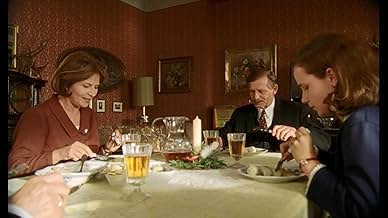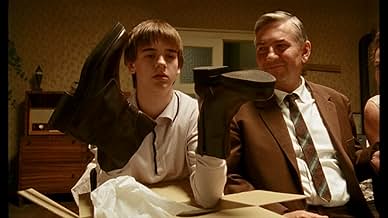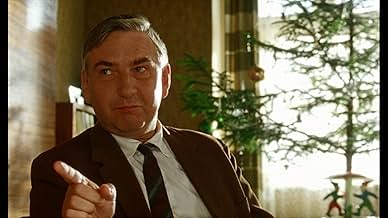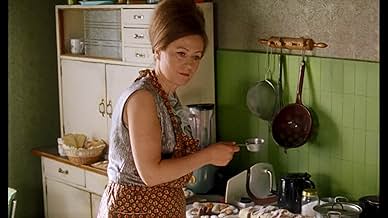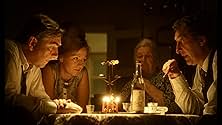IMDb RATING
8.1/10
6.6K
YOUR RATING
Two families, Sebkovi and Krausovi, are celebrating Christmas, but not everyone is in a good mood. Teenage kids think their fathers are totally stupid; fathers are sure their children are no... Read allTwo families, Sebkovi and Krausovi, are celebrating Christmas, but not everyone is in a good mood. Teenage kids think their fathers are totally stupid; fathers are sure their children are nothing more than rebels, hating anything they say.Two families, Sebkovi and Krausovi, are celebrating Christmas, but not everyone is in a good mood. Teenage kids think their fathers are totally stupid; fathers are sure their children are nothing more than rebels, hating anything they say.
- Director
- Writers
- Stars
- Awards
- 8 wins & 8 nominations total
Marek Javorský
- Péta
- (as Marek Morvai Javorský)
- Director
- Writers
- All cast & crew
- Production, box office & more at IMDbPro
Featured reviews
I really enjoyed watching this movie. I found this gem by accident and I'm surprised that it hasn't found it's way to a major audience here in Germany although quite a few Czech movies run on public television. The movie is funny and witty but at times also sad and deadly serious. Like many other Czech movies the story is made up of small parts that fit together as a whole picture. There's the stubborn army officer a convinced communist and his family, there's the war hero that strongly opposes the communist regime a choleric and his family and the single teacher and her son who try to find a new man for the family and there are the teenagers of those families that don't really care about politics or what their parents think is important. Those are the main characters that form a whole picture of life in Czechoslovakia during the Prague spring in 1968. The stories switch at easy from funny to hilarious to sad and back. I recommend this movie to everyone to watch. It is certainly worth the time. Other reviews state that you have to be Czech to fully understand everything. Well, I could relate to the characters as well though I might have missed a cultural reference or two.
10Fnord233
Prague in 1968 prior to the Soviet invasion. The setting is ideal for a political drama, but Czech artists prefer to make a comedy with political background. The action takes place in a house, where families from different political camps (pro-communist vs. anti-communist) live together. The story is told in such a warm, witty and funny way that it immediately resembles the golden years of Czech movie industry in the 70's and 80's. This movie was a tremendous hit on the local Czech market, unfortunately it has never reached my country (Poland). I've had a chance to see it only on the Warsaw Film Festival. It's sad but all the time distributors prefer to show s****y Hollywood cheesy-style romances or action packs, instead real-value movies. Definitely one of the movies of 1999 IMHO. The same goes for other Czech movie - "Return of the Idiot" (Navrat Idiota) - watch out for Czechs, they are on the right track again.
10Olhado
Watching this movie at the Wellington International Film Festival, surrounded by emotional ex-patriot Czechs is an experience I will always remember and treasure.
The film details life during the Prague Spring, leading up to the Russian invasion. The humor is very Czech, and splendidly so. The ending reminded me of exactly why the Politician is the lowest form of life on the planet.
Go see this movie wherever and whenever you can.
The film details life during the Prague Spring, leading up to the Russian invasion. The humor is very Czech, and splendidly so. The ending reminded me of exactly why the Politician is the lowest form of life on the planet.
Go see this movie wherever and whenever you can.
Cosy Dens (1999) is the ironic name given to the film that was called Pelísky in Czech. The movie was directed by Jan Hrebejk.
Two families are celebrating Christmas in the same apartment house during the Prague Spring. The father of one family is patriotic and anti-Russian. The father of the other is an army officer, and pro-Russian. The basic plot revolves around the relationships between these families. Clearly, the families symbolize two aspects of Czech society in 1968--some refused to accept the Soviet occupation, and denounced it when they could. Others turned the occupation to their advantage.
The movie has several plot threads. The two fathers argue constantly. The young son of one family loves the daughter of the other. (It's not Romeo and Juliet--his love is unrequited.) An aunt hopes to find a husband, but her son and her bad luck get in the way.
It's interesting that even the army officer's family celebrate with a traditional Christmas. It's very interesting--at least to a non-Czech--that the families keep a live carp in the bathtub, which is apparently a traditional aspect of the Czech Christmas.
The film is not just a comedy. It is a symbolic representation of the tensions of the Czech people, who must adapt to the fact that Russia controls their destiny. They don't know--but we know--that the Prague Spring will come to an end not through liberation, but through the roar of the Warsaw Pact tanks rolling through Prague.
There's a long shot of birds in a cage near the end. The presenter of the film made the symbolism clear. The birds have enough food and water to survive, but the central fact of their existence--like that of the Czechs--is that they are not free.
Seen as part of the outstanding Alan Lutkus International Film Series at SUNY Geneseo. The film is on DVD, and was projected onto the large screen. It will work on the small screen as well.
Two families are celebrating Christmas in the same apartment house during the Prague Spring. The father of one family is patriotic and anti-Russian. The father of the other is an army officer, and pro-Russian. The basic plot revolves around the relationships between these families. Clearly, the families symbolize two aspects of Czech society in 1968--some refused to accept the Soviet occupation, and denounced it when they could. Others turned the occupation to their advantage.
The movie has several plot threads. The two fathers argue constantly. The young son of one family loves the daughter of the other. (It's not Romeo and Juliet--his love is unrequited.) An aunt hopes to find a husband, but her son and her bad luck get in the way.
It's interesting that even the army officer's family celebrate with a traditional Christmas. It's very interesting--at least to a non-Czech--that the families keep a live carp in the bathtub, which is apparently a traditional aspect of the Czech Christmas.
The film is not just a comedy. It is a symbolic representation of the tensions of the Czech people, who must adapt to the fact that Russia controls their destiny. They don't know--but we know--that the Prague Spring will come to an end not through liberation, but through the roar of the Warsaw Pact tanks rolling through Prague.
There's a long shot of birds in a cage near the end. The presenter of the film made the symbolism clear. The birds have enough food and water to survive, but the central fact of their existence--like that of the Czechs--is that they are not free.
Seen as part of the outstanding Alan Lutkus International Film Series at SUNY Geneseo. The film is on DVD, and was projected onto the large screen. It will work on the small screen as well.
10jerzym
In last few days I've made my own home festival of Czech movies. Today in cue was Hrebejk's "Pelisky". Some times ago I've watched his Musime Si Pomahat so I expect great film. But today's movie touched me very deep, reminding some moments from my life. I was born in 1952 so in 1968 I was in same age as young characters of the movie. In august I was on my holidays in the little town in south Poland where my granny lived - just about 150 km from the border of Czechoslovakia. For the rest of my life I will remember the sound of the soviet warplanes heard 20/21 August. I've been watching this movie with the tears in my eyes. I knew all the songs from the CSR big-beat groups because in 1967/68 I've everyday listen the Stanice Hviezda from Ostrava - 80 km from my home town. Really, really great movie. Understandable not only for the Czech & Slovak people.
Did you know
- TriviaMost of the jokes used in the movie are based on Czech writer Petr Sabach's book "Hovno hori" ("Shit burns"). The book consists of various unconnected stories.
- GoofsWhen Elien receives the package from America, it has three stamps affixed totaling only 8 cents. Notwithstanding that this is a paltry amount of postage to send a heavy package abroad, the three stamps had not been yet issued in America in December 1967. (The green Jefferson stamps were issued January 1968 and the larger Eisenhower stamp not until 1969)
- ConnectionsFeatured in Kovy: Vsehochut #1 (2016)
- How long is Cosy Dens?Powered by Alexa
Details
Box office
- Gross worldwide
- $2,227,953
- Runtime1 hour 55 minutes
- Color
- Sound mix
- Aspect ratio
- 1.66 : 1
Contribute to this page
Suggest an edit or add missing content


